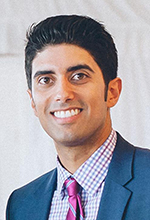Posts Tagged ‘lawyers’
Breakstone, White & Gluck and Cambridge Police Team Up for Children’s Bike Helmet Giveaway During National Bike Safety Month
With a donation from Breakstone, White & Gluck, the Cambridge Police Department will distribute bicycle helmets to children who need one during National Bike Safety Month.
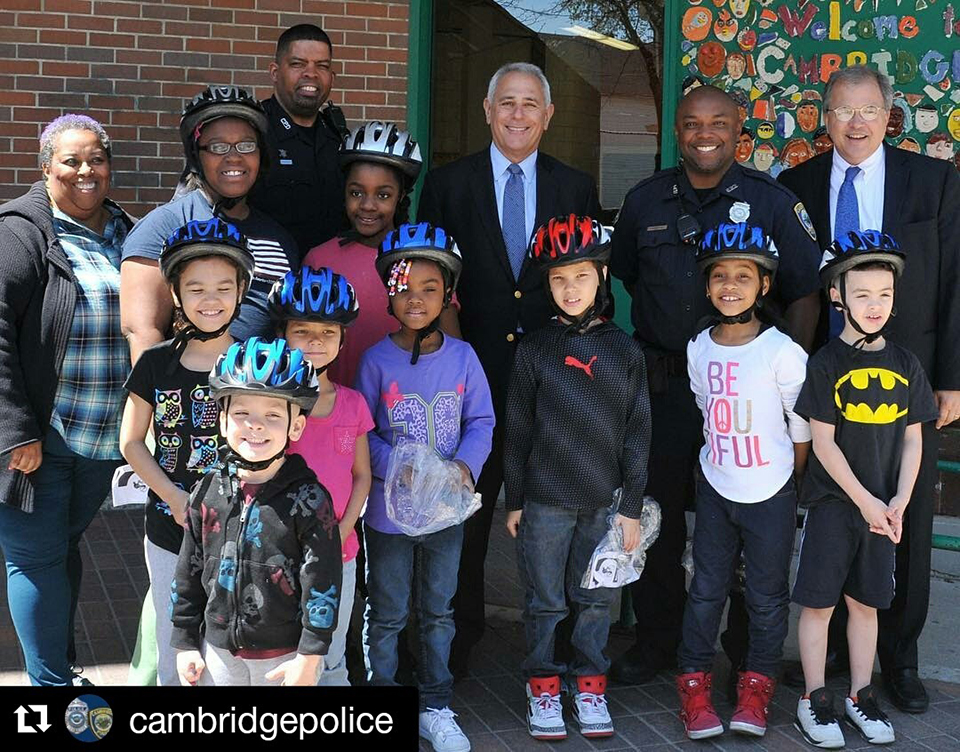
Photo: Attorney Ronald Gluck and David White of Breakstone, White & Gluck gather with children at the Cambridgeport School, Assistant Principal Audrey M. Sturgis and Cambridge police officers Che Santos and Anthony Santiago. Breakstone, White & Gluck was pleased to donate children’s bicycle helmets to the Cambridge Police Department for National Bike Safety Month in May 2016.
Cambridge Police has announced its first “helmet voucher” program as part of its National Bike Safety Month initiatives in May. Police officers will specifically be looking for children who are riding bicycles without a helmet throughout May and hand them a “helmet voucher,” which can be redeemed for a free bicycle helmet at the Cambridge Police Department.
Breakstone, White & Gluck donated 140 bicycle helmets to the Cambridge Police in hopes of keeping children safe and preventing traumatic brain injuries from bicycle accidents. The donation was part of our Project KidSafe campaign, which has donated more than 10,000 bicycle helmets to children since 2013.
Massachusetts law requires any person 16 years old or younger riding a bicycle to wear a helmet. By wearing a helmet, cyclists can reduce their chance for head injury by 50 percent, according to the Insurance Institute for Highway Safety.
This is a special donation and Attorney Ron Gluck and Attorney David White joined Cambridge Police at the Cambridgeport School for an unofficial kick off last week. Here are some photos:
Attorney Ron Gluck and Attorney David White join children at the Cambridgeport School along with Audrey M. Sturgis, assistant principal, and Cambridge police officers Che Santos and Anthony Santiago, to kick off the bike helmet giveaway during National Bike Safety Month.
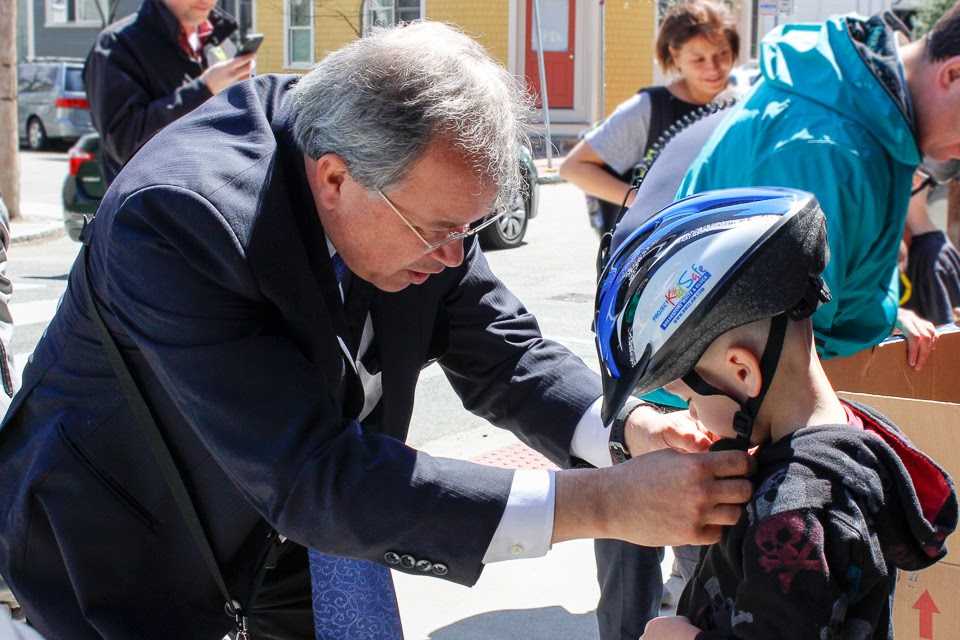
Attorney David White helps a child fit a bicycle helmet.
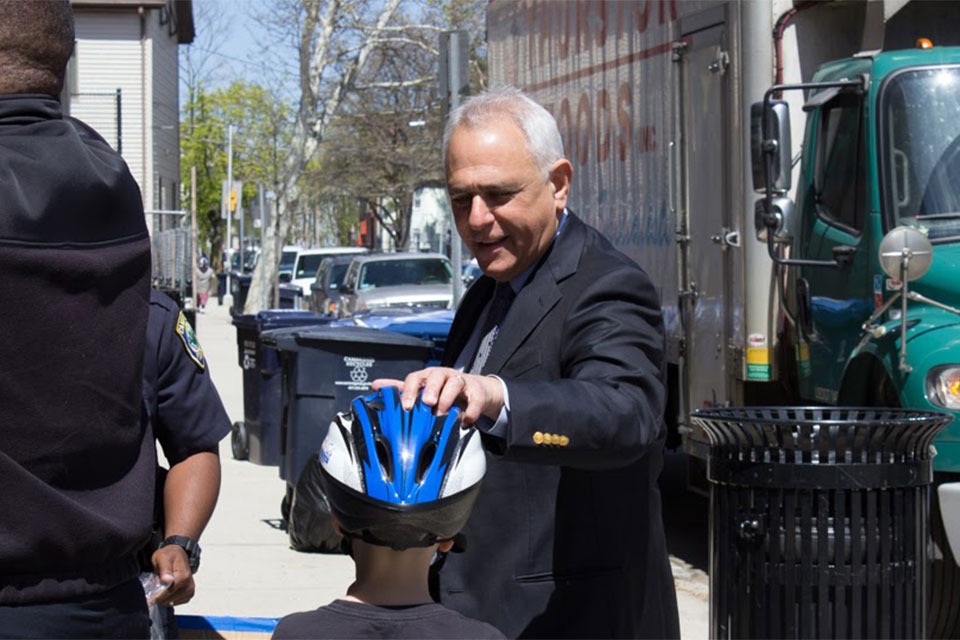 Attorney Ron Gluck finishes fitting a helmet.
Attorney Ron Gluck finishes fitting a helmet.
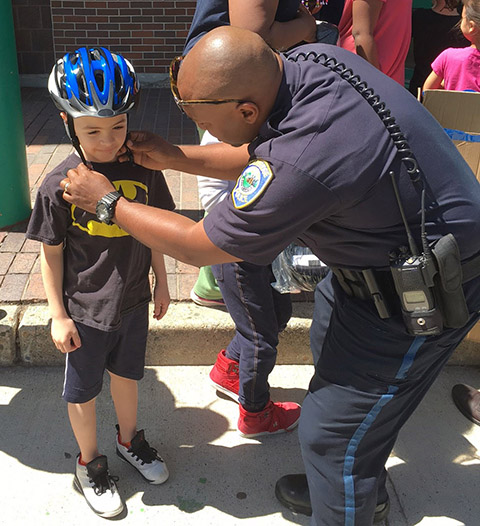 Cambridge police officers will distribute the bicycle helmets – and also show children how to properly fit them.
Cambridge police officers will distribute the bicycle helmets – and also show children how to properly fit them.
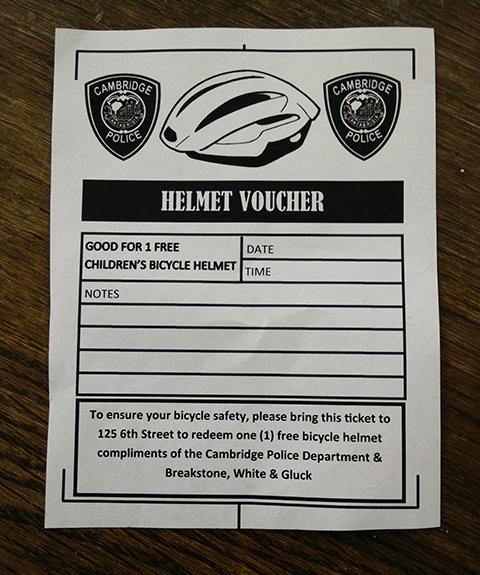 Cambridge Police will distribute these vouchers to children who are not wearing bicycle helmets during May.
Cambridge Police will distribute these vouchers to children who are not wearing bicycle helmets during May.
For more information on how to properly fit a bicycle helmet, visit our Project KidSafe webpage.
About Breakstone, White & Gluck
Breakstone, White & Gluck is a Boston personal injury law firm which is committed to the safety of all bicyclists in Massachusetts. We have over 100 years combined experience representing bicyclists injured by the negligence of others. If you, or a member of your family, has been injured in a bicycle incident, please feel free to contact us for a free legal consultation at 800-379-1244 or 617-723-7676 or use our contact form. Thank you and RIDE SAFE!
Massachusetts Social Host Law: Teenagers and Even Parents Can Face Criminal Charges and Financial Losses for Underage Drinking
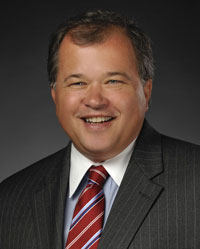 During prom and graduation season, students should be enjoying their friends and last days of high school. But this time can turn painful if you or your teenager allow underage drinking in your home.
During prom and graduation season, students should be enjoying their friends and last days of high school. But this time can turn painful if you or your teenager allow underage drinking in your home.
Breakstone, White & Gluck cares about the safety of teenagers on the road and offers these tips and reminders about the Massachusetts Social Host Law, M.G.L. c. 138, § 34.
“Very few parents realize just how much is at stake when they allow underage drinking in their home,” said Attorney David W. White of Breakstone, White & Gluck. “You may have to live with the painful knowledge that you contributed to a car accident which caused serious injury or death. Plus, you may have to serve jail time and could even lose your home to a lawsuit.”
Under the Social Host Law, it is a criminal offense for parents and teenagers to provide alcohol to anyone who is underage for consumption in their home. It is also illegal to allow a minor to bring alcohol from elsewhere to drink in your home.
You can also be charged if underage guests are drinking at other places you control, such as a hotel room, a vacation house, or a rental property.
Consequences
If you are charged under the Massachusetts Social Host Law, you could face a fine up to $2,000, imprisonment for up to a year or both. You may also face a civil lawsuit. Your homeowner’s insurance policy may or may not cover the full amount.
You could also be held civilly liable if you provide your teen alcohol to drink at someone else’s home and they later injure someone while driving.
These Cases Really Do Happen
Teenagers and adults are charged criminally for violating the Social Host Law every year in Massachusetts. For example, in December 2015, a Saugus couple – two teachers – were sentenced to jail for hosting an August 2013 party at their home where teens were drinking. Police learned about the party when a 16-year-old became ill and had to be treated at a local hospital.
The two teachers – one an Everett High School teacher – were sentenced to 30 days in jail, with the balance suspended for two years. During that time, they must stay drug and alcohol free and perform 50 hours of community service.
There have been many other criminal cases in Massachusetts. There have also been civil cases.
Attorney David White provided legal commentary on one 2014 case for Fox 25 TV News. A 23-year-old man was ordered to pay $2 million to the parents of a Salem State College student who consumed alcohol at a party he hosted. She was killed in a car accident after she left, in a car driven by her boyfriend who had been also been drinking at the party. Read this coverage.
Here are a few safety tips for you and your teen:
Tell Your Teen There is Zero Tolerance for Underage Drinking. Tell your teen there is zero tolerance for violating the Social Host Law or any underage drinking. Explain what is at stake for them and your whole family.
Help Your Teenager Plan. Help your teenager develop a safe after-prom or graduation plan. Some high schools or community groups organize events as safe havens where there will be no alcohol.
Have Your Teen Commit to Safety. Ask your teen to sign a pledge not to drink or get in the car with others who have been drinking. Here is one pledge from Mothers Against Drunk Drivers (MADD). You can find others online or create your own.
Also, tell them they must always stick with the schedule when they are out with friends and call you beforehand about changes or unplanned stops.
Safety Code.Finally, have a safety code you can use with your teenager. If they call you during the evening, you can ask them if they feel safe or want to come home. That way you, as the parent, can take the blame for prohibiting any change of plans. Your teen can save face by “blaming” you and telling their friends they cannot go out this time.
About Breakstone, White & Gluck
The Boston personal injury attorneys at Breakstone, White & Gluck have over 100 years combined experience handling serious car accidents. If you have been injured, it is important to learn your rights. For a free legal consultation, contact us at 800-379-1244 or 671-723-7676 or use our contact form.
Annual Walk to the Hill for Civil Legal Aid: Lawyers, Advocates Seek $27 Million Budget for Low-Income Services
We joined hundreds of lawyers at the Massachusetts State House Thursday to lobby for increased funding for civil legal aid. We gathered as part of the 17th Annual Walk to the Hill for Civil Legal Aid. Funding is in crisis in Massachusetts, with nearly two-thirds of eligible low-income residents who seek help being turned away.
With an increase, more people will be able to stay in their homes, find shelter and avoid hardship. Please keep reading this blog on the $27 million budget appropriation sought and visit this page to contact your legislator.
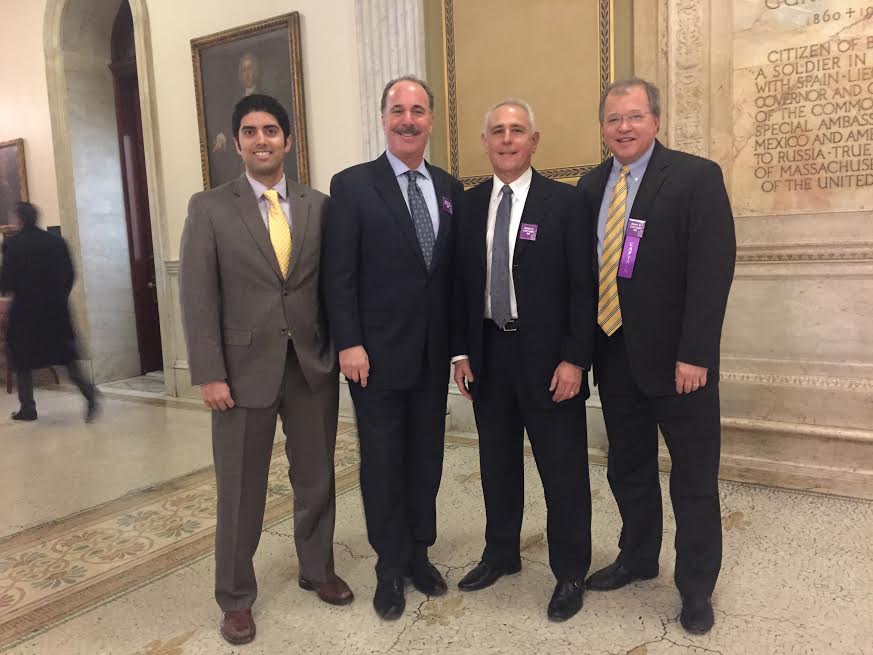
Right to Left: Attorney David W. White, Massachusetts Bar Association President (2007-2008), Attorney Ronald E. Gluck, Attorney Marc L. Breakstone and Attorney Reza Breakstone at the Annual Walk for Civil Legal Aid on January 28, 2016.
The annual event, sponsored by the Equal Justice Coalition, draws lawyers from across the Commonwealth for a day of lobbying for the Massachusetts Legal Assistance Corporation, which provides legal aid for the poor and underserved.
This year, lawyers asked for the state appropriation for civil legal aid services to be increased from $17 million to $27 million in Fiscal Year 2017. Governor Charlie Baker has proposed $17.17 million, a $170,000 increase.
Lawyers from more than 40 private firms attended this year, along with Attorney General Maura Healey and Chief Justice Ralph Gants of the Supreme Judicial Court, who addressed participants:
“In a few minutes you will meet with legislators and members of their staff to ask them to increase the state appropriation for civil legal services from $17 million to $27 million,” Gants said. “Many will ask you: ‘How can we afford an increase of that size during a challenging budget season?’ And you will answer: ‘How can we afford not to?'” Gants’ comments were published by the Massachusetts Bar Association’s Lawyers E-Journal.
Contact Your State Legislator
Search this website to find your legislator.Find Out How to Contact Your State Legislator
Once you have the name of your legislator, look up their address on this website or you can do a general Google search.
Post blog note: Our thanks to the Equal Justice Coalition, who later recognized us with the Nancy King Award for the highest percentage of attorneys participating at a firm – 4 out of 4, or 100 percent!
The coalition also recognized: Wilmer Hale for having the most attorneys participate and Ropes & Gray and Foley Hoag with exceptional support awards. Sally & Fitch was honorably mentioned. Highest participation among law schools went to UMass Law, which had 56 students in attendance. Liberty Mutual was the leading corporate law department, with 24 participants.
Recreational Use Statute No Bar to Recovery for Mother Injured at Go-Cart Business
In an important victory for an injured mother, the Appeals Court permitted a plaintiff’s negligence claim to survive a motion for summary judgment, overturning a Superior Court judge’s holding that the recreational use statute barred recovery.
Background
On January 14, 2016, the Appeals Court in Amaral v. Seekonk Grand Prix Corp., No. 13-P-1848, slip op. (Mass. App. Ct. Jan. 14, 2016) overturned the decision of a Superior Court judge which immunized a business from liability for personal injuries under the recreational use statute, M.G.L. c. 21, § 17C(a): “Public use of land for recreational, conservation, scientific educational and other purposes; landowner’s liability limited; exception.”
The question on appeal arose when summary judgment was granted to the defendant, Seekonk Grand Prix Corp., a go-cart, mini-golf, bumper car, and arcade business, which was sued by a mother who was injured on their premises.
The defendant argued to the Superior Court judge that the mother was watching her two sons drive go-carts, which constituted a recreational activity, when she was injured on the premises. Specifically, a little girl drove through a fence and struck the plaintiff causing a number of injuries including a pulmonary embolism that resulted from a blood clot in her leg. The defendant noted that the mother did not pay a fee to be on the premises to watch her children drive go-carts and was thus barred from recovery under the recreational use statute.
The Superior Court judge, citing case law indicating that the statute provided immunity from liability when a landowner did not impose a charge or fee for an injured plaintiff’s recreational use of the land, agreed, and granted the defendant summary judgment. See Seich v. Canton, 462 Mass. 84, 85-86 (1997) (holding municipality’s fee to defray expenses for participation in a basketball league did not constitute fee for public use of town land; thus, parent who was injured in a slip and fall while attending daughter’s basketball game was barred from action against town); Whooley v. Commonwealth, 57 Mass. App. Ct. 909, 910 (1997) (barring plaintiff from recovery for slip and fall at hockey rink under recreational use statute because she had free use of the rink for the recreational purpose of spectating her grandson’s hockey game and she failed to show evidence that grandson’s hockey team in fact paid for its use of the rink).
Recreational Use Statute
The Massachusetts recreational use statute provides that those who make their land available to the public for “recreational . . . purposes without imposing a charge or fee therefor, . . . shall not be liable for personal injuries. . . sustained by such members of the public . . . in the absence of wilful, wanton, or reckless conduct by [the landowner].” M.G.L. c. 21, § 17C(a).
On the other hand, § 17C(b) states that “[t]he liability of any person who imposes a charge or fee for the use of his land by the public for the purposes described in subsection (a) shall not be limited by any provision of this section. For the purposes of this section, ‘person’ . . . shall include, without limitation, . . . [a] corporation, company or other business organization . . . .”
No Definitive Definition of Recreational Use
The Appeals Court in Amaral noted that the term “recreation” was not defined by statute, nor had it ever been defined by the Supreme Judicial Court. Dicta in Catanzarite v. Springfield, 32 Mass. App. Ct. 967, 967 (1992) construed the term “recreation” to include “passive pursuits, such as watching baseball,” but the Supreme Judicial Court “prefaced this remark by stating that it had ‘never defined the term.'” At least one other Appeals Court case cited the dicta in Catanzarite but “in a manner that leaves in some doubt its own views of the principle.” Nantasket Beachfront Condos. LLC v. Hull Redev. Authy., 87 Mass. App. Ct. 455, 465 n.13 (2015).
Appeals Court Decision: Mother’s Use Was Neither Recreational Nor Free
On appeal, the Appeals Court noted that the plaintiff’s presence on the property was not for a recreational purpose: she was a parent who accompanied minor children, purchased tickets for their use of go-carts, and remained to supervise them. In essence, the plaintiff was using the facility for the recreation of her children, and she paid for that use by purchasing tickets.
The court reasoned that application of the recreational use statute’s immunity provision would undermine the very purpose of the statute: “to encourage landowners to permit broad public free use of land for recreational purposes by limiting their obligations to lawful visitors under the common law.” Furthermore, the court noted that the mother purchased the tickets for use of the go-carts, tickets which she could have conceivably used herself.
Because the plaintiff was charged a fee for her particular use of the land, her use was not free. Nor was her activity–monitoring her minor children while they drove go-carts–recreational in nature. Therefore, summary judgment was not appropriate. The judgment of the Superior Court was vacated and the case remanded for further proceedings consistent with the Appeals Court’s decision.
Conclusion
Individuals should be mindful that their use of land designed for public recreational use, free of charge, comes with the caveat that the landowner may not be responsible for any personal injury absent wanton, willful, or reckless conduct. Always proceed with caution when engaging in pickup sports games, or recreational activities that could lead to personal injuries. If you or someone you know has been injured, do not hesitate to contact the attorneys at Breakstone, White & Gluck, PC of Boston for a free consultation.
About Reza Breakstone
Reza Breakstone joined Breakstone, White & Gluck as an associate in 2015. Reza has earned a reputation as a tough and tenacious litigator helping both individuals who have been personally injured and burgeoning companies who have had insurance and contract disputes. After law school, Reza joined the Boston office of Mintz Levin, where his practice encompassed complex business litigation, federal antitrust defense, and securities litigation.While at Mintz Levin, Reza received a fellowship to serve as an Assistant District Attorney with the Suffolk County District Attorney’s Office, working out of the West Roxbury Division of the Boston Municipal Court. In this year-long fellowship position, he prosecuted a wide range of criminal offenses and gained valuable in-court and trial experience having tried seventeen cases before a judge or jury, and securing convictions in a majority of his trials before a jury. Read his bio.
Many Pedestrian Accidents in Massachusetts Since New Year
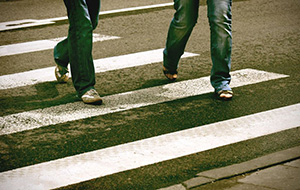 During the first two weeks of 2016, Massachusetts has already seen several serious pedestrian accidents.
During the first two weeks of 2016, Massachusetts has already seen several serious pedestrian accidents.
Last weekend, a 56-year-old security guard leaving work was killed in a hit-and-run accident on West Boylston Street in Worcester. Police have charged a 21-year-old man with motor vehicle homicide by negligent operation and other violations.
Last week, a 68-year-old pedestrian was killed in South Hadley, as he crossed the street in front of his home. In that case, the driver remained on the scene and police opened an investigation.
In Palmer, a 59-year-old pedestrian was killed while using a crosswalk at the intersection of North Main and Rockview streets. The pedestrian accident occurred about 5 p.m. in the day and the driver fled the scene.
Then in Cape Cod, a 19-year-old man was also killed when hit while crossing Route 28 in Yarmouth.
A few concerns for pedestrians in the winter:
Plow trucks. Last winter, at least two pedestrians in the Boston area were killed in parking lots by snow plow trucks. A 60-year-old employee at the Whole Foods store in Medford was struck and killed while walking across the store’s parking lot. A few days earlier, a Weymouth woman was hit and killed by a snow plow driver who was clearing the parking lot outside her condominium complex.
Parking lots. Pedestrians are just as vulnerable in parking lots as they are in streets. Last week, a pedestrian was hit in the South Street shopping plaza in Holyoke, in front of the Save-A-Lot supermarket.
Crosswalks. In Massachusetts, pedestrians who are crossing the street in a crosswalk or at an intersection with the “Walk” signal have the right of way. But drivers often fail to stop for pedestrians – and sometimes crossing guards. A crossing guard in Holyoke was struck by a car and injured at 8 a.m. one day last week.
About Our Experience
The Boston personal injury attorneys at Breakstone, White & Gluck have over 100 years combined experience representing individuals who have been injured in pedestrian accidents. Attorney Ronald E. Gluck recently negotiated a $1.25 million settlement for the family of a woman who was hit and killed in a crosswalk.
City of Boston to Lower Speed Limits to Reduce Traffic Fatalities
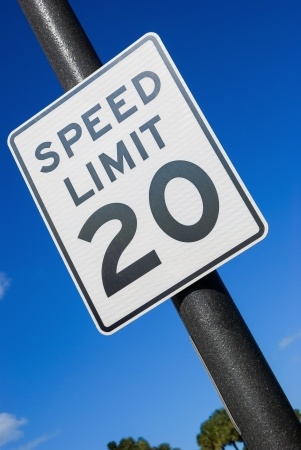 Good news for pedestrians and cyclists: the City of Boston plans to lower speed limits to 20 MPH in some neighborhoods. Officials will also advocate to lower Boston’s default speed limit to 25 MPH.
Good news for pedestrians and cyclists: the City of Boston plans to lower speed limits to 20 MPH in some neighborhoods. Officials will also advocate to lower Boston’s default speed limit to 25 MPH.
Mayor Marty Walsh released the city’s Vision Zero Action Plan last week, including the Neighborhood Slow Streets Program, which will be launched in 2016. A pilot program will introduce traffic calming measures and a 20 MPH speed limit to the Talbot-Norfolk Triangle in Dorchester and the Stonybrook neighborhood in Jamaica Plain. The full program will be launched later in the year and residents across the city can apply.
The default speed limit on local roads in Massachusetts is 30 MPH. The Massachusetts State Legislature must approve any change and it has not acted on past bills. The Metropolitan Area Planning Council, a proponent of the change, has said lowering the speed limit would prevent 2,200 car crashes, 18 fatalities and 1,200 injuries across the state each year. Some $210 million would be saved in medical payments and lost work.
In 2014, Boston Emergency Medical Services treated two to three people each day due to pedestrian and bicycle accidents.
Earlier this year, Mayor Walsh announced Boston would adopt Vision Zero to eliminate traffic fatalities and injuries by 2030. The far-reaching plan includes many infrastructure and technology changes, from the implementation of smart parking meters to building protected bike lanes in crash-ridden areas and better data collection among city departments.
Boston joins other cities around the world in adopting Vision Zero initiatives. The first was adopted in Switzerland nearly 20 years ago. In recent years, New York City, San Francisco and Chicago have adopted plans.
New York lowered its default speed limit from 30 MPH to 25 MPH last year and San Francisco city supervisors began discussing a 20 MPH speed limit last winter.
Read More
Breakstone, White & Gluck Answers Safety Questions about Bicycle Helmets
Breakstone, White & Gluck is pleased to be donating children’s bicycle helmets again this year through our Project KidSafe campaign. As part of this work, we get to go out and meet children and families at community events. Over the years, we have been asked some great questions about bicycle helmet use. Here are some of our answers:
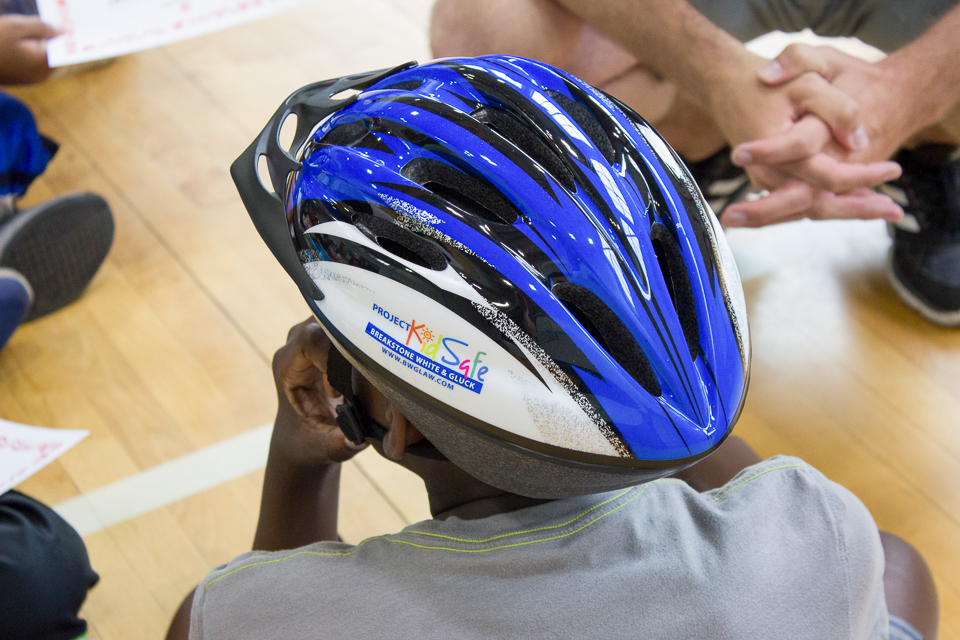
Do I Have to Wear a Bicycle Helmet?
Yes! Massachusetts law requires cyclists 16 years old and younger to wear bicycle helmets when they ride. If you want to learn more, the statute is M.G.L. c. 85 § 11B.
While the law does not require parents to wear helmets, we encourage you to do so. If you wear one, your children will follow your lead and take the message to heart. Wearing a bicycle helmet is the most effective step you can take to prevent a serious head injury if you are involved in a bicycle accident. This is a good lesson for your children to learn early on.
What Else Should I Know About the Law on Bicycle Helmets?
M.G.L. c. 85 § 11B states helmets must be secured to a person’s head by straps and meet the safety standards set by the U.S. Consumer Product Safety Commission.
When Should I Replace a Helmet?
Always replace helmets after a fall or bicycle accident, even if it does not appear damaged. Also replace the helmet if it no longer fits or the straps have worn. If the helmet is over three years old, it should be replaced.
Can Helmets be Handed Down from Child to Child?
Unlike bicycles, it is probably a better practice to not pass helmets down to younger siblings, unless they are still in excellent condition. If you are still considering re-using a helmet, think about how long the first child wore it and if they had any cycling accidents or falls. It is hard to know how many times a child has fallen, so the safe bet is to get a new helmet.
About Breakstone, White & Gluck and Project KidSafe
Breakstone, White & Gluck, a Boston personal injury law firm, launched our Project KidSafe campaign in 2013, with a goal of encourage safe bicycling. We have donated over 7,000 bicycle helmets to children throughout eastern Massachusetts and have worked with organizations such as Boston Bikes’ Roll It Forward, Massachusetts Safe Routes to Schools, Bikes Not Bombs and local bicycle committees and police departments.
Our attorneys have published safety and other informational materials for cyclists on our website:
What Every Massachusetts Cyclist Should Know About Car Insurance
Many cyclists are unaware they can purchase coverage for bicycle accidents through their car insurance policies. This is important because many drivers are underinsured or uninsured and many injured cyclists have to recover medical costs and other damages through their own car insurance policies. Read more.Massachusetts Bicyclists’ Rights and Responsibilities
Read a summary of the responsibilities of cyclists and motorists in Massachusetts.
Attorney Marc L. Breakstone Responds After State Police Announce Former Patriots Player Brandon Spikes Will Be Charged With Leaving Scene of Personal Injury Crash
Attorney Marc L. Breakstone spoke to Fox 25 News Boston after State Police issued a citation charging former New England Patriots linebacker Brandon Spikes in the hit-and-run accident that injured a family of three. Breakstone is representing the family.
“It’s surprising to them that Mr. Spikes would drive so recklessly and then just leave the scene,” Breakstone told the news station. “It will affect them for a long time. This could have been a story with a tragic ending.”
Spikes will be charged with leaving the scene of a personal injury crash, operating a motor vehicle negligently to endanger, speeding and failure to stay within marked lanes. He was cut by the New England Patriots after State Police opened the investigation.
Breakstone, White & Gluck Participates in Bike Friday
Today was Bike Friday, sponsored by Boston Bikes, the city office which promotes safe cycling. Bike Friday is one of the last events of Bay State Bike Week. It included a number of organized rides and a gathering at Boston City Hall. Breakstone, White & Gluck was there to share information about our Project KidSafe campaign.
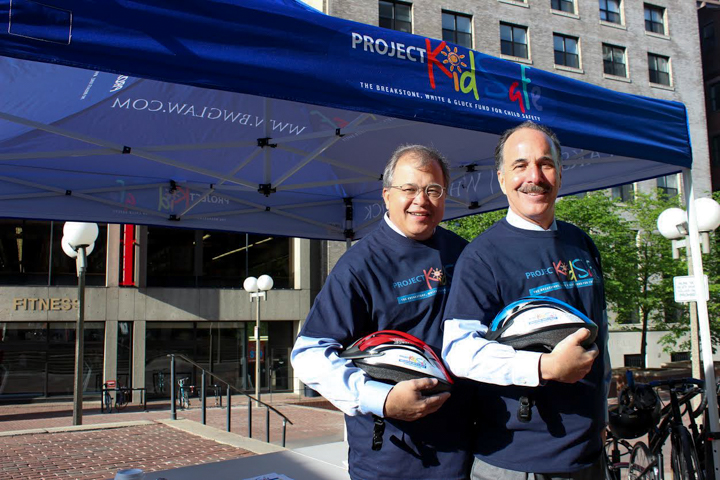
Attorney David W. White and Attorney Marc L. Breakstone of Breakstone, White & Gluck participated in Bike Friday at Boston City Hall Plaza. The two attorneys were there to support the cyclists as they rode in and to share information about the firm’s Project KidSafe campaign.
Boston Bikes organizes Bike Fridays to celebrate those who ride their bikes to work and to encourage others. More than two dozen organizations and vendors signed up for today’s event. While 200 cyclists registered for the event, organizers estimated up to 350 cyclists actually pedaled in and enjoyed a free breakfast, courtesy of Boloco.
Breakstone, White & Gluck participated for the first time and set up our Project KidSafe tent to show support for the cyclists. Attorneys David W. White and Marc L. Breakstone were among the crowd waiting for the cyclist convoys, which came in from Lexington, Newton, Somerville and many other communities.
Other organizations which participated included MassBike, Boston Cyclists Union, Livable Streets Alliance, Hubway and Landry’s Bicycles.
Marc and David spoke to a number of cyclists about our Project KidSafe initiative, through which we donate bicycle helmets to children who need one in the Boston and Worcester areas. We have donated more than 4,000 bicycle helmets since 2013, through partner organizations such as CYCLE Kids of Cambridge, Somerville and Cambridge public schools, Bikes Not Bombs, Massachusetts Safe Routes to Schools, the Westborough Bicycle and Pedestrian Advisory Committee. We have also worked with Boston Bikes’ Roll It Forward program, which refurbishes used bicycles and donates them to city residents who may not otherwise have access to a bicycle.
After the event, Marc said, “It is rewarding for us to be able to give back to the community in a way that promotes safety for children. We look forward to continuing our Project KidSafe program, and to expanding it in the years to come.”
The next Bike Friday events are scheduled for June 26th, July 24th and August 28th. Read more about the event.
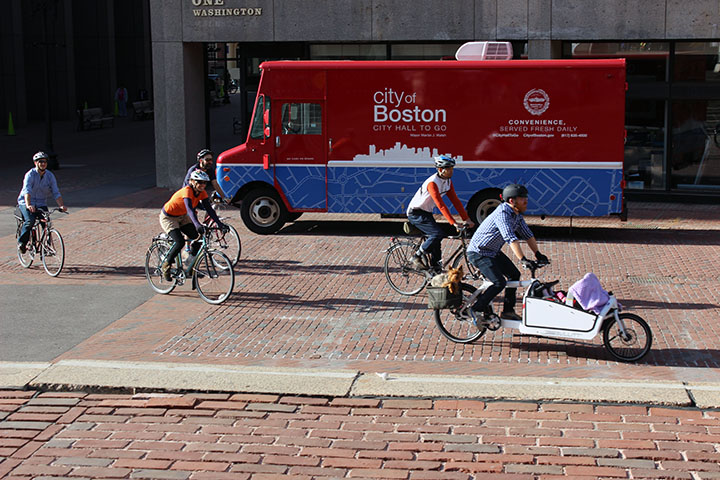
The cyclists came in in convoys this morning, traveling in from Lexington, Arlington and other communities. While 200 cyclists registered in advance, organizers estimate 350 actually rolled in.
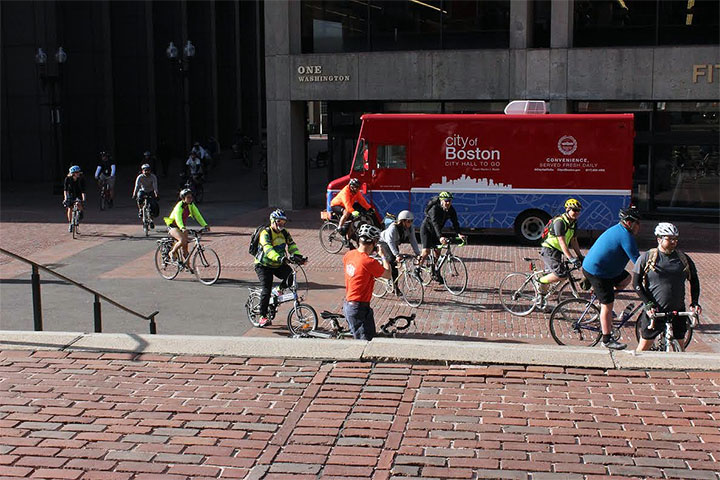
Parents: Time to Talk to Teen Drivers About Safety
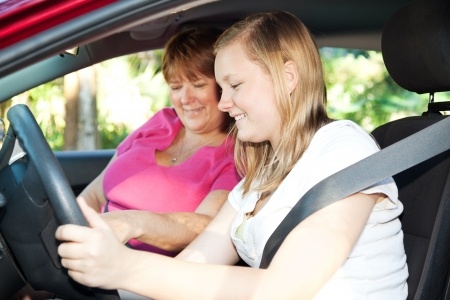 With the snowbanks nearly gone, your teen driver is likely asking for the car keys. Now is a very good time to talk to them about paying attention on the roads and following traffic laws.
With the snowbanks nearly gone, your teen driver is likely asking for the car keys. Now is a very good time to talk to them about paying attention on the roads and following traffic laws.
Young people ages 16 to 19 are nearly three times more likely to be in a fatal motor vehicle crash than other age groups. While cell phone use is a frequent cause, there is also simple inexperience. If you are a parent, you know this conversation takes a lot of work and a lot of repetition.
We offer these safety tips for teen drivers:
- Always wear your seat belt.
- Keep your hands on the wheel and your eyes on the road.
- Do not take phone calls while driving. The caller can leave a voicemail.
- Remember that under Massachusetts Junior Operator License, teen drivers are not allowed to use cell phones behind the wheel. You cannot send texts or make phone calls. If you are caught, you may be fined and your license suspended. It is important to think about these steps for the safety of others and to keep yourself out of trouble.
- If you must use your phone, pull off the road to a safe area. Put the car in park and remove the keys. Or ask a passenger to call or answer for you.
- Travel with the phone in the best place to reduce distraction. If your phone ringing or lighting up with messages distracts you, set it in a bag in the backseat.
- Remember that whatever is happening on your phone can wait, whether it is a social media post, e-mail or photo. It really can.
- Be mindful of distractions created by loud music or intense conversation. Explain to passengers you need to limit conversation while driving.
- Remember you cannot carry passengers under the age of 18 during the first six months with a Massachusetts Junior Operator License. The one exception is you can drive with siblings.
- Do not look up phone numbers or GPS directions on your phone while driving.
- Many cars have dashboard GPS systems and infotainment systems. Turn them off until you are more experienced.
Other Safe Driving Habits
- Never consume alcohol and drive. No driver should, but you are more likely than older drivers to get in car accidents because you lack driving experience.
- Before entering your vehicle, look around for other cars, trucks and hazards. Make sure you provide bicyclists and pedestrians extra time to pass.
- Shift your eyes every two seconds and check the rear-view mirror every five to eight seconds. This will help you focus on driving.
- Do not drive drowsy. If you are tired, you will be less capable of responding to potential car accidents. The Massachusetts Junior Operator License restricts young drivers from traveling between 12:30 a.m. and 5 a.m., unless accompanied by a parent. This is a good step but realize you always have to be aware of your fatigue level and make good decisions at all hours.
- Even if you have your license, keep practicing. For instance, if you are weak backing up, practice backing into a parking space in an empty parking lot with a parent. Keep practicing because you will need these skills going forward and will not always have the time to practice.
- There are construction work zones in many places. Be extra attentive, slow down and watch for workers.
- Check your speed regularly and slow down. A little extra space between you and the car in front of you can make a big difference toward preventing a car accident.
- Drive defensively. Expect the unexpected will happen and you may have to stop or change lanes.
- Signal your intentions to turn or switch lanes early enough to give others time to prepare.
- Do not drive on the highway on your own before you are ready.
- Limit the number of times you drive your friends home after sports practices, to the mail or school events. Every teenager looks forward to driving around with their friends, but teens are more likely to become distracted this way.
- Be careful in school zones and school buses. Slow down and watch out for teenagers and children walking or riding bikes. You are required to stop when school buses stop.


